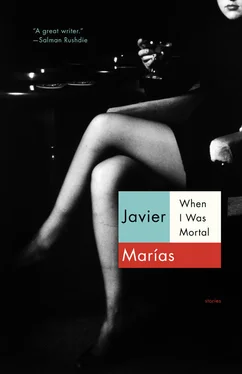I sat looking at his rather corpulent body, he seemed tall even when sitting down. He had no difficulty holding my gaze, his somnolent eyes would never have blinked or looked away, those misty eyes would have stared me down into hell itself. There was no longer any sign of weakness in that face, it was gone in a moment.
“Who put his glasses on him?” I said at last. “Whose idea was it to put them on?”
The inspector made an impatient gesture, as if my question made him think that I hadn’t, after all, deserved either the explanation or the story.
“Who cares?” he said. “Don’t talk to me about pranks in the middle of a homicide case. Just ask the questions that matter.”
I did as he said. “Didn’t anyone want to see the body of that unusually lively dead woman? The judge, the pathologist.”
He shrugged.
“Don’t be so naive. Here and in the morgue we do as we like. We investigate what we want to and nobody asks any awkward questions. We had a long apprenticeship, forty years doing exactly as we pleased without ever having to answer to anyone, we can’t just throw that away. I mean under Franco, perhaps you don’t remember. Although it’s much the same anywhere, there’s no shortage of learning opportunities.”
Gómez Alday wasn’t entirely lacking in humour. He wasn’t the kind of person you should ask such a question, but I did:
“Why did you go to such lengths for that boy? You were taking a hell of a risk even so.”
There was a brief flash in those sleepy eyes, then he did what he had done once before: he spun round in his seat and turned his back on me, as if bringing to a close his sporadic dealings with me. I stared at the broad nape of his neck as he said:
“I risked everything.” He fell silent for a moment and then added casually: “Haven’t you ever been in love?”
I turned and opened the door to leave. I didn’t reply, but I seemed to recall that I had.
I SAW HIM twice in the flesh and the first time was both the happiest and the most unfortunate, although it was only unfortunate retrospectively, that is, it is now but it wasn’t then, so really I shouldn’t say that it was. It was in the Joy discotheque, very late at night, especially for him, you imagine that a footballer should go to bed really early, always thinking about the next game, or just training and sleeping, watching videos of other teams or their own, watching themselves, their successes and failures and the missed opportunities that go on being missed for all eternity in those films, sleeping and training and eating, living the life of married babies, it’s good if they have a wife who can be a mother to them and supervise their timetable. Most take no notice, they hate sleeping and hate training, and the really great players only think about the game when they actually run out onto the pitch and realize that they had better win because there are a hundred thousand people who have spent the whole week thinking about the confrontation or wanting vengeance against their hated rivals. For great players those rivals only exist for ninety minutes and for one reason only: they are there to stop them getting what they want, that’s all. Later they would happily go out for a drink with those same adversaries, if it wasn’t frowned upon. Resentment is for the mediocre players.
He, of course, was not a mediocre player and for some time it was thought that he would become a great player, once he was more mature and more focused, which never happened, or happened perhaps too late. He was Hungarian, like Rubala and Puskas and Kocsis and Czibor, but we found his surname much less easy to pronounce, it was written Szentkuthy and people ended up calling him “Kentucky”, which sounded more familiar and more Spanish, which is why people sometimes rather rudely referred to him as “Fried Chicken” (which didn’t tally at all with his athletic build), the bolder and more outspoken of the radio commentators allowed themselves to get carried away when he stepped on to the pitch: “For Barcelona tonight it looks like it could be out of the frying pan and into the fire.” Or else: “Kentucky is really cooking with gas tonight; he’s looking to give the other side a real roasting. This boy is pure boiling oil, he’s hot, he’s slippery and someone might just get their fingers burned!” Journalists got a lot of mileage out of him, but they have short memories.
When I bumped into him at the Joy discotheque, he had been in Madrid for a season and a half and already spoke good Spanish, very correct, though somewhat limited, with a pronounced but perfectly tolerable accent, it seems that people from Central Europe all have a facility for languages, we Spaniards are the least gifted when it comes to learning other languages or pronouncing them, that’s what the Roman historians said, a people incapable of pronouncing an initial S, as in Scipio or Schillaci or Szentkuthy: Spaniards say Escipión, Esquilache, Kentucky, linguistic tendencies have changed. Szentkuthy (I’ll call him by his real name, since I only have to write it not say it) had already had time to get over the novelty of a country that was new, fun and luxurious compared to his previous harsh existence, but not yet long enough to take it as natural and inevitable. Perhaps he had reached the point that follows every important attainment, when what you have achieved no longer seems to you like a mere gift or a miracle (you recognize it as an achievement) and you begin to fear for its permanence or, rather, to look with horror on any possible return to a past to which you were once resigned and which you tend therefore to erase, I am not who I was, I am only now, I come from nowhere and I do not know myself.
We were brought together at the same table by mutual acquaintances, although he only came over from time to time in order to recover his glass for a second and take a sip between dances, a form of training, a tireless athlete, at least he would have the energy to keep going for ninety minutes and into extra time. He was not a good dancer, he danced too enthusiastically and with no sense of rhythm, he lacked the necessary talent to bring harmony to his movements, and some of the people at the table were laughing at him, in this country there’s an element of cruelty in every situation, even when there’s no reason for it, people take pleasure in hurting or thinking that they do. He dressed better than when he had first arrived, according to the photos I saw in the press, but not as well as his Spanish colleagues, who were keener students of fashion, that is, of fashion advertisements. He was one of those men who always gives the impression that he’s got his shirt hanging out of his trousers, even if he hasn’t, of course, on the pitch he wore his shirt outside when the referee allowed it. He did, at last, come and sit down and, laughing and gesturing, ordered everyone else onto the dance floor so that he could watch them while he was resting, now it was his turn to have some fun, though doubtless without malice or cruelty, perhaps merely hoping to learn other movements less awkward than his own. I was the only one who did not obey him, I never dance, I just watch. He didn’t insist, not because he didn’t know who I was, we’d not been introduced — that didn’t seem to bother him, certain that everyone knew who he was — but because of the definite way I said no. I shook my head the way we city-dwellers do when we refuse alms to a beggar and pass by without even slackening our pace. The comparison isn’t mine, it was his:
“You look like someone refusing me alms,” he said when we were alone, the others were all out on the dance floor just to please him. He used the “usted” form like any good foreigner who still sticks to the rules, his vocabulary wasn’t bad, the word “alms” isn’t that common.
Читать дальше












